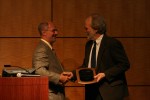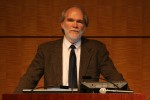The Long Term Ecological Research (LTER) Network is the recipient of the 2010 Distinguished Scientist Award by the American Institute of Biological Sciences (AIBS).
According to AIBS, the Distinguished Scientist Award (previously named the Distinguished Service Award) has been presented annually since 1972 to individuals or groups who have made significant scientific contributions to the biological sciences, integrative and organismal biology in particular.
G. Philip Robertson, the Chair of the LTER Science Council and Executive Board, accepted the Award on behalf of the LTER Network during the award ceremony, held May 18, 2010, in Washington, DC. Robertson, who is also professor of Ecosystem Science in the Department of Crop and Soil Science at Michigan State University and Principal Investigator for the Kellogg Biological Station LTER site in Michigan, observed: "We are both grateful for and humbled by this high honor, which recognizes the collective contributions of several thousand Network scientists working to advance ecological knowledge in ecosystems facing unprecedented environmental change."
The Award is a significant recognition of the LTER program’s contribution to the field of biological sciences since its creation in 1980 by the National Science Foundation (NSF). “AIBS is pleased to recognize the contributions of the LTER Network in this, its 30th Anniversary year,” said Dr. Richard O'Grady, AIBS Executive Director. “A shining example of excellence in our nation's scientific enterprise, the LTER program focuses on large-scale, multi-disciplinary research and has truly transformed ecological and environmental science in the U.S. and world-wide. The program and the scientists and students that have conducted research at LTER sites or with LTER data have fundamentally advanced human understanding.”
According to Robert B. Waide, the Executive Director of the LTER Network Office and biology professor at the University of New Mexico, “the Award represents the cumulative efforts of more than 2000 LTER scientists, students, information managers, educators, and staff working on experiments and observational studies that will inform present and future understanding of ecological systems.”
Other awardees were Duke University Professor of Biology Dr. Kathleen K. Smith (Outstanding Service Award), Dr. Jo Handelsman, the Howard Hughes Medical Institute Professor in the Department of Molecular, Cellular and Developmental Biology at Yale University (Education Award), and Dr. Mark A. McPeek, the David T. McLaughlin Distinguished Professor of Biological Sciences at Dartmouth College (President's Citation).
Present at the award ceremony were several NSF program officers, including Bette Loiselle (Director, Division of Environmental Biology), Todd Crowl (LTER Program Officer), and Jim Collins, former Assistant Director for Biology.
The LTER Network comprises 26 sites funded by NSF to pursue basic research in ecology and environmental science. Since 1980, site scientists have conducted research to better understand long-term ecological phenomena in both natural and managed ecosystems. A broad variety of ecosystems are represented in the Network, including tundra, forest, grassland, desert, agricultural, urban, and marine sites, among others. For further information, including a list of current sites and principal investigators, see www.lternet.edu.
The Mission of the LTER Network is to provide the scientific community, policy makers, and society with the knowledge and predictive understanding necessary to conserve, protect, and manage the nation’s ecosystems, their biodiversity, and the services they provide.
For more information please contact McOwiti O. Thomas, (tmcowiti@lternet.edu), 1.505.277.2638

 Enlarge this image
Enlarge this image

